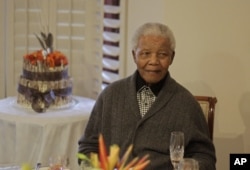JOHANNESBURG —
Nelson Mandela’s second hospitalization this year has raised concerns among South Africans and around the world about the future despite government assurances that the hospitalization is for routine tests. President Zuma said Sunday the former leader was “comfortable” and in good spirits, but South Africans are worried about their beloved former president.
Nelson Mandela wrote about feeling, upon his release from prison, that he had failed to be there for his own children and grandchildren. Instead, he wrote, his decades-long struggle against apartheid had turned him into the father of his nation.
That became clear this weekend as news of his Saturday hospitalization spread and the Internet buzzed with virtual get-well cards from luminaries, journalists and ordinary South Africans.
Mandela spent Saturday night in the hospital and appeared “comfortable and in good care” on Sunday morning, said President Jacob Zuma.
Still, the get-well wishes keep coming.
Congregants packed Soweto’s landmark Regina Mundi church on Sunday to pray for him.
Chelsea Clinton tweeted Saturday night: “Thinking of Madiba and the entire Mandela family - hope Madiba comes home soon.”
Like many South Africans, Clinton used Mandela’s clan name, Madiba, which is a sign of respect. Many South Africans just call him Tata, the Xhosa word for father.
Little is known about Mandela’s condition or his prognosis. Mac Maharaj, a spokesman for the presidency who also spent years alongside Mandela at the infamous Robben Island prison, gave few details, citing patient confidentiality. He would not say what Mr. Mandela’s prognosis was or how long he might remain in the hospital.
Maharaj, who spoke to VOA shortly after arriving in the southeastern coastal city of Durban, said he accompanied Zuma on the Sunday morning hospital visit in Pretoria.
He said the former president appeared well, and urged the world to not worry and to respect his privacy.
“I believe not just South Africans but millions throughout the world will be praying for Madiba, and we are appealing to people to respect his privacy. We want his treatment to be unimpeded, to be done under the least stressful conditions, and for the doctors to have a free hand to attend to him. I’m sure everybody wishes that for him.”
On the streets of Johannesburg’s gritty inner-city Hillbrow neighborhood, 33-year-old businesswoman Sharon Zinhle said she is worried about the former leader’s health. She says he brought many positive changes to her life and to the country, and said that since he left office governance has deteriorated.
“It’s really bad, it’s really bad. Because if we lose him, hey, we don’t know what’s going to happen to this country, really. During the times of Madiba there was no corruption, I think so, there was no corruption But with this new, ah, the corruption, is too much.”
Mandela became South Africa’s first black president in 1994 after spending 27 years in prison for leading the fight against apartheid. He shared the 1993 Nobel Peace Prize with former President F.W. De Klerk for engineering an end to apartheid.
Mandela served only one term as president and retired from public life in 2004, telling the next generation, “it’s in your hands.” He has since carefully tried to avoid cultivating a cult of personality - with little success. Last month, the government put his face on its bank notes.
It is clear South Africans are not ready to let go of their icon. Many feel they have not had enough time with him. After all, Mandela spent much of his adult life in prison, denied access to the world and with few visits even from his family.
In Hillbrow and across town in the sprawling Soweto townships, South Africans prayed for his recovery, as they would for their own grandfather.
For Sibusiso Mangena, a 28-year-old gardener, that’s what Mandela feels like. “He’s a family member. He’s a big family member. He did a lot for us. He gave us freedom, no fighting. We are just cool for him, you see,” said Mangena.
On the streets of Johannesburg, the message was unanimous: Get well, Tata, get well.
Nelson Mandela wrote about feeling, upon his release from prison, that he had failed to be there for his own children and grandchildren. Instead, he wrote, his decades-long struggle against apartheid had turned him into the father of his nation.
That became clear this weekend as news of his Saturday hospitalization spread and the Internet buzzed with virtual get-well cards from luminaries, journalists and ordinary South Africans.
Mandela spent Saturday night in the hospital and appeared “comfortable and in good care” on Sunday morning, said President Jacob Zuma.
Still, the get-well wishes keep coming.
Congregants packed Soweto’s landmark Regina Mundi church on Sunday to pray for him.
Chelsea Clinton tweeted Saturday night: “Thinking of Madiba and the entire Mandela family - hope Madiba comes home soon.”
Like many South Africans, Clinton used Mandela’s clan name, Madiba, which is a sign of respect. Many South Africans just call him Tata, the Xhosa word for father.
Little is known about Mandela’s condition or his prognosis. Mac Maharaj, a spokesman for the presidency who also spent years alongside Mandela at the infamous Robben Island prison, gave few details, citing patient confidentiality. He would not say what Mr. Mandela’s prognosis was or how long he might remain in the hospital.
Maharaj, who spoke to VOA shortly after arriving in the southeastern coastal city of Durban, said he accompanied Zuma on the Sunday morning hospital visit in Pretoria.
He said the former president appeared well, and urged the world to not worry and to respect his privacy.
“I believe not just South Africans but millions throughout the world will be praying for Madiba, and we are appealing to people to respect his privacy. We want his treatment to be unimpeded, to be done under the least stressful conditions, and for the doctors to have a free hand to attend to him. I’m sure everybody wishes that for him.”
On the streets of Johannesburg’s gritty inner-city Hillbrow neighborhood, 33-year-old businesswoman Sharon Zinhle said she is worried about the former leader’s health. She says he brought many positive changes to her life and to the country, and said that since he left office governance has deteriorated.
“It’s really bad, it’s really bad. Because if we lose him, hey, we don’t know what’s going to happen to this country, really. During the times of Madiba there was no corruption, I think so, there was no corruption But with this new, ah, the corruption, is too much.”
Mandela became South Africa’s first black president in 1994 after spending 27 years in prison for leading the fight against apartheid. He shared the 1993 Nobel Peace Prize with former President F.W. De Klerk for engineering an end to apartheid.
Mandela served only one term as president and retired from public life in 2004, telling the next generation, “it’s in your hands.” He has since carefully tried to avoid cultivating a cult of personality - with little success. Last month, the government put his face on its bank notes.
It is clear South Africans are not ready to let go of their icon. Many feel they have not had enough time with him. After all, Mandela spent much of his adult life in prison, denied access to the world and with few visits even from his family.
In Hillbrow and across town in the sprawling Soweto townships, South Africans prayed for his recovery, as they would for their own grandfather.
For Sibusiso Mangena, a 28-year-old gardener, that’s what Mandela feels like. “He’s a family member. He’s a big family member. He did a lot for us. He gave us freedom, no fighting. We are just cool for him, you see,” said Mangena.
On the streets of Johannesburg, the message was unanimous: Get well, Tata, get well.





